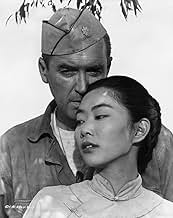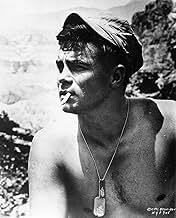Füge eine Handlung in deiner Sprache hinzuA US Army Major stationed in East China in 1944 is ordered to blow up military installations in order to slow down the advancing Japanese Army.A US Army Major stationed in East China in 1944 is ordered to blow up military installations in order to slow down the advancing Japanese Army.A US Army Major stationed in East China in 1944 is ordered to blow up military installations in order to slow down the advancing Japanese Army.
- Regie
- Drehbuch
- Hauptbesetzung
- Sgt. 'Mike' Michaelson
- (as Henry 'Harry' Morgan)
- Bit Role
- (Nicht genannt)
- Chinese Captain
- (Nicht genannt)
- Bit Role
- (Nicht genannt)
Empfohlene Bewertungen
Stewart's character is a U.S. military engineer working with a small team trying to slow a Japanese advance in China. Though there's plenty of action (especially explosions), the emphasis is on the Americans' interaction with their Chinese allies -- which is fraught with problems. Stewart's character has a local love interest, played by Lisa Lu, but their relationship is nothing like a conventional GI romance.
"The Mountain Road" was obviously meant to be a thought-provoking look back at World War II, and to audiences in the early 1960s it probably was. The climax may have been almost shocking. In today's more jaded world, the movie is likely to strike many viewers as dull, with an ending that resolves very little. But it you still have a rose-colored view of the "Greatest War," and think it was less morally messy than our current conflicts, this could be enlightening.
The film shows the challenges of military command and conflicts that the lead character, Major Baldwin has. James Stewart plays that part very well. His conflicts are different in that most of his decisions about blowing up bridges, roads and even buildings in villages affect hundreds of civilians.
All of the cast are very good in their roles. Among the most prominent are Lisa Lu who plays Madame Sue-Mei Hung, Harry Morgan who plays Staff Sgt. Mike Michaelson and Glenn Corbett who plays Collins.
An interesting aspect of this film is that there are no Japanese soldiers. The Americans never encounter the enemy. The film depicts some of the aspects of the Chinese culture that Major Baldwin had not yet learned. The terrain looked like it could have been filmed in China, but was mostly rugged hilly country and mountains in Arizona.
The film has some impressive scenes of explosions. Some consider it an anti-war film, and it fits that mold of most war movies that show the horrors, death, destruction and insanity of war.
It's a good film, but not great. War film buffs and those who enjoy history should enjoy it. Others, especially modern audiences used to fast and furious entertainment, may find it hard to sit through.
The best line in the film is from Alan Baxter who plays Gen. Loomis. After Stewart's character tells him that he had asked for the command, Loomis says, "You know what command is, major?" Maj. Baldwin replies, "Well, sir, the book says... " And Gen. Loomis says, "Command is power. Pure, simple, unlimited."
Wusstest du schon
- WissenswertesThe film includes themes considered to be taboo for Hollywood during the war years, such as tensions between allies and racism among Americans.
- PatzerWhen Baldwin and his unit arrive at the ammunition dump they're supposed to blow up, it consists of several small buildings and shacks. But the interior shots showing mountains of ammunition have no resemblance to the buildings they're supposed to be in: two of them are clearly gigantic tunnels ten or twenty times as long as the buildings that are supposedly being inspected.
- Zitate
Major Baldwin: Colonel, I'm gonna blow up this road. Now, how can we keep the people off?
Col. Kwan: Off?
Major Baldwin: Well, I-I, I need them stopped for about ten minutes. Can you do it?
Col. Kwan: How?
Major Baldwin: Well, uh, how 'bout, uh, how 'bout if we get a couple of empty gasoline drums, put 'em on either side of the road, stretch a rope across.
Col. Kwan: They'd go under the rope.
Major Baldwin: Well, then we get some Chinese soldiers to explain to them, explain to them that we're cutting the road. How 'bout that?
Col. Kwan: The soldiers will want to get through themselves.
Major Baldwin: Well, could we give them something?
Col. Kwan: What?
Major Baldwin: Well, money?
Col. Kwan: They cannot spend money here.
Major Baldwin: Well, food. How 'bout food? We got 'K' rations, cigarettes. How about cigarettes? What'll they take for the job?
[Kwan Says something in Chinese]
Major Baldwin: [Angrily] I don't speak Chinese, Colonel.
Col. Kwan: There is no way.
- VerbindungenFeatured in Hollywood Chinese (2007)
Top-Auswahl
- How long is The Mountain Road?Powered by Alexa
Details
- Erscheinungsdatum
- Herkunftsland
- Sprachen
- Auch bekannt als
- El camino del odio
- Drehorte
- Stewart Mt. Roads, Salt River Canyon, Arizona, USA(refugee road sceens)
- Produktionsfirma
- Weitere beteiligte Unternehmen bei IMDbPro anzeigen
- Laufzeit1 Stunde 42 Minuten
- Farbe
- Seitenverhältnis
- 1.85 : 1
Zu dieser Seite beitragen


































